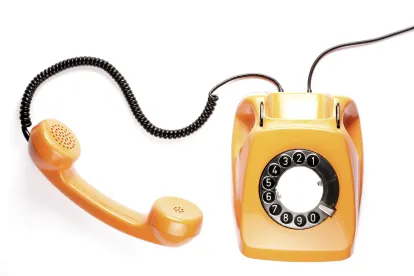Try as they might, Telephone Consumer Protection Act (TCPA) plaintiffs’ lawyers continue to face judicial resistance to deeming all phones autodialers (automatic telephone dialing systems or ATDS’s). In the latest example, the U.S. Southern District of California granted summary judgment to the defendant, finding the plaintiff’s “evidence” of autodialer use too speculative and too disconnected to the specific calls at issue. See Chyba v. Bayview Loan Serv., 2016 U.S. Dist. LEXIS 133849 (S.D. Cal. Sept. 27, 2016). As the court reasoned, “[N]o matter the name given to the equipment, the ‘basic function’ of an autodialer is ‘the capacity to dial numbers without human intervention.’” Id. at *5 (quoting In re Rules and Regulations Implementing the Tel. Consumer Prot Act of 1991, 18 FCC Rcd. 14014, 14092 (July 3, 2003)).

The decision is instructive for TCPA autodialer defense generally because it addresses several types of evidence that plaintiffs’ lawyers often rely on in these cases and finds them insufficient as follows:
-
The court rejected the plaintiff’s claim that an artificial time delay between answering and speaking on the other end of the call demonstrated autodialer use. “Her contention that there was an ‘artificial time delay’ at the beginning of each call does not raise a dispute regarding whether [defendant] used equipment having the capacity to store, produce, and autodial numbers.” Id. at *9
-
As to a job posting by the defendant for a customer relations business analyst (of which the court refused to take judicial notice but about which the court still opined), the court reasoned that references to an Avaya Call Management System, a Witness Call Center Recording System and Presence Contact Solution Technology did not show that the specific equipment used to call the plaintiff was an autodialer. Id. at *10
-
As to a 2009 Form S-11 for registration of securities stating that the defendant “operates an advanced Avaya phone system, call center and auto-dialer,” the court, while rejecting judicial notice, still reasoned that the system referred to incoming, not outgoing, calls. Id. at *11
-
As to two Standard and Poor’s (S&P) servicer evaluations saying that the defendant operated “in a well-automated environment” using “automated call distribution (ACD) and interactive voice response (IVR) systems,” the court rejected judicial notice but still reasoned that the IVR system simply enabled call routing, and the ACD system distributed incoming calls. Id.
-
As to the two statements in the S&P evaluations stating that loan counselors “may begin early intervention calling campaigns through an auto-dialer” and that a “predictive dialer allows customized calling campaigns,” the court (still rejecting judicial notice) reasoned that those statements were insufficient to suggest that such equipment was in fact used to call the plaintiff. Id. at *10.
In this case, the plaintiff’s lawyer engaged in strained contortions common among TCPA plaintiffs’ lawyers trying to have systems deemed autodialers. Fortunately, the court saw these efforts for what they were and granted summary judgment against them. Unfortunately, the good result didn’t arrive until summary judgment (presumably after substantial defense costs). We look forward to judges’ continuing to adopt similar reasoning, as early as possible, in these often baseless cases.



 />i
/>i

